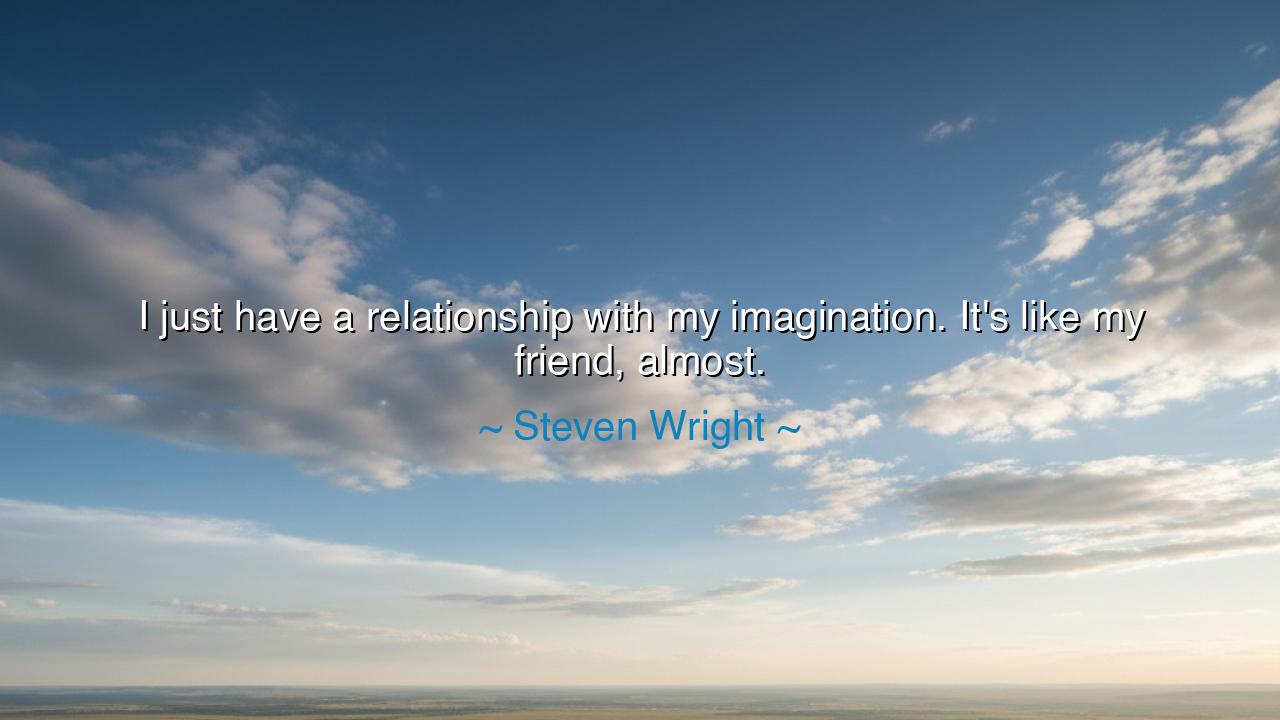
I just have a relationship with my imagination. It's like my






“I just have a relationship with my imagination. It’s like my friend, almost.” — thus spoke Steven Wright, the quiet jester of thought, whose humor bends reality with the elegance of paradox. Beneath his dry wit lies a truth both tender and profound — that imagination is not merely a tool or talent, but a companion, a living force that walks beside us through every season of the soul. In this confession, wrapped in simplicity, Wright reveals one of the oldest secrets known to poets, dreamers, and visionaries: that the imagination is not something we use; it is something we befriend.
To call imagination a friend is to recognize it as a presence within the self — an unseen voice that listens, questions, and comforts. It is the confidant of the artist, the playmate of the child, the muse of the thinker. In Wright’s world of surreal comedy, where one sentence can turn logic on its head, this friendship with imagination is essential. His humor lives in that twilight between reason and dream — a space only the imagination can navigate. For imagination, like a loyal friend, allows one to see the familiar from a new angle, to laugh at life’s contradictions, and to glimpse wisdom in absurdity.
In ancient wisdom, the imagination was regarded as divine companionship. The poets of old spoke not of inventing but of receiving inspiration — as though the Muse herself whispered through their minds. The prophet, the philosopher, the artist — all were guided by this inner friend. Even Socrates spoke of his daimonion, a guiding voice within that warned him from error and urged him toward truth. So too, Wright’s “relationship with his imagination” is a continuation of this sacred lineage — a modern echo of humanity’s ancient partnership with the creative spirit.
Consider the story of Nikola Tesla, who, in the silence of his mind, saw entire machines before they were ever built. His imagination was not a flight of fancy, but a faithful companion that showed him the unseen patterns of energy and invention. When he spoke of his discoveries, he did so as one describing visions shared by a trusted friend. Tesla once said, “I do not rush into actual work. When I get an idea, I start at once building it up in my imagination.” Like Wright, he lived in communion with that unseen ally, that eternal friend who opens the invisible door to discovery.
But Wright’s quote also carries gentleness — the suggestion that one must tend this friendship. The imagination, like any friend, withers when neglected. The modern soul, drowned in noise and haste, forgets how to listen to it. We trade the living voice of inner creativity for the cold chatter of endless distraction. Wright reminds us, through humor and humility, to restore that relationship — to spend time in silence, to play with thought, to let imagination speak again. It is not a servant, to be commanded for profit; it is a friend, to be cherished for its companionship.
The lesson of this quote is simple yet profound: nurture your relationship with imagination as you would with a beloved companion. Speak with it often. Give it room to breathe. Wander with it into dreams and possibilities. When life becomes dull or rigid, imagination will remind you that reality itself is porous — that wonder can still be found in the smallest corner of existence. It will teach you to see the extraordinary in the ordinary, and to approach even sorrow with curiosity and grace.
And so, let this teaching stand: Imagination is the soul’s oldest friend. It walks beside you unseen, offering gifts of vision, humor, and renewal. Do not silence it with fear, nor smother it with reason. Instead, speak to it as Wright does — with warmth, with familiarity, with love. For those who keep company with imagination never walk alone; they travel in the company of creation itself, and through that friendship, they find truth, laughter, and light in every corner of the world.






AAdministratorAdministrator
Welcome, honored guests. Please leave a comment, we will respond soon